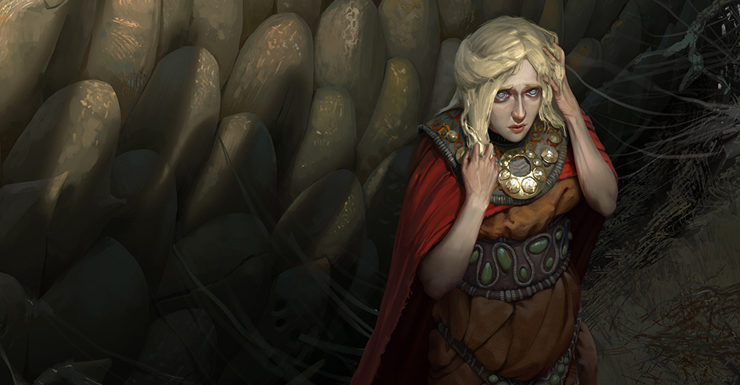In Which the Son of Húrin… Well… It’s Hard to… Oh, It’s All Just the Worst
As Túrin confronts the dreaded father of all dragons on the doorstep of Nargothrond, it’s time for us to confront the second half of the Tale of the Children of Húrin as summarized in Chapter 21 of The Silmarillion. Here the tale widens, as we are reminded through new tragedies that Túrin isn’t the only doomed child of Húrin—nor the only one yoked by the curse of Morgoth.
We left off with Túrin operating under the name of Mormegil, the Black Sword, where his coming to Nargothrond had unfortunately spelled out its own ruin after some crummy choices. If you haven’t read part one of this tale, consider doing so before reading on…
Dramatis personæ of note:
- Túrin – Man of constant sorrow, cursed hero
- Glaurung – Dragon, provocateur extraordinaire
- Morwen – Woman, mother who knows “best,” wife of Húrin
- Nienor – Woman, little sis of Túrin, daughter of Morwen and Húrin
- Mablung – Sinda, chief captain, bearer of bad news
- Níniel – Woman, amnesiac, see Nienor
Of Túrin Turambar, continued
Having succumbed to the Mormegil’s well-meaning but terrible military advice, Nargothrond’s goose is now well and truly cooked. Glaurung, the first Urulókë, sire of all dragonkind, has already blasted down its doors and an army of Orcs has streamed through to ransack the place. They’ve killed or driven away any Elf who dared to stand and actually fight. (I’m thinking Celebrimbor, the future-famous son of Curufin, is one of those who was forced to flee, because Nargothrond was where we last left him, and we’ll not see him again until the Second Age!)
Now it’s just the noncombatants who’re being chained up for the slave-train back to Angband. One of these is Finduilas, princess of Nargothrond, daughter of Orodreth, formerly the king of this guarded stronghold. At least, it had been guarded before Túrin showed up.
Glaurung crawls back out from the shattered doors and hails Túrin as the man dares to approach the dragon with his black sword drawn. Túrin doesn’t try to match wits with the dragon; he springs forward to attack. He’s brave to begin with, but his valor here also stems from another place: the possibility of absolution.
Maybe. See, with his dying breath, Túrin’s friend Gwindor had offered him a lifeline. Had offered what might even be considered a loophole in Morgoth’s curse, which has been hanging over Túrin for most of his life and has been a contributing factor in the woe of many. Speaking specifically of Finduilas, Gwindor had said that “she alone stands between thee and thy doom. If thou fail her, it shall not fail to find thee.”
Translation: rescue the princess and you win the game. Subvert Morgoth’s curse entirely! Although Túrin might have been dealt a losing hand simply because of who his father is, with the foresight of death Gwindor has given him an out. And the key lies in saving Finduilas.
Note, there’s no saving Nargothrond itself. Túrin can maybe save the Elf-princess, though—she who loves him against her better judgment. But alas, this isn’t a proper battlefield and Glaurung isn’t doing that whole rampaging, fire-spewing thing right now, not as he had against so many Elves and Dwarves in past wars. With Túrin he has a different card to play and it’s one given to him by his Master.
So it doesn’t come to blows. Glaurung pins Túrin down with his gaze alone, hitting the would-be savior with a spell that holds him paralyzed. Like an über-strong Hold Person spell, and Túrin just rolled a nat “1” on his saving throw against it. This ability, and the fact that we’re told he spoke “by the spirit that was in him” reminds us that he’s not just a giant reptile bred by Morgoth, but one inhabited by an evil spirit—very obviously a powerful one, on par with a Maia.
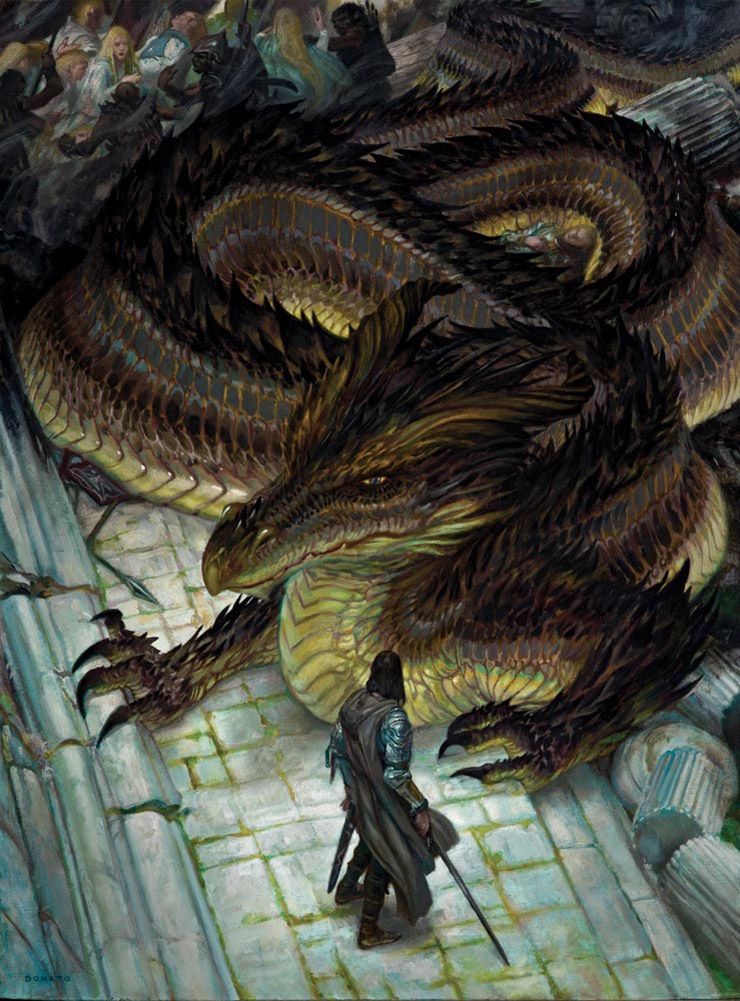
And then Glaurung reveals that he’s not just a spirit-possessed monster. He’s also a dick. He taunts Túrin even as he reveals that he’s well acquainted with the man’s history thus far—Morgoth’s spies have been working overtime—by rattling off Túrin’s greatest hits like they’re a bunch of new names.
Thankless fosterling, outlaw, slayer of thy friend, thief of love, usurper of Nargothrond, captain foolhardy, and deserter of thy kin. As thralls thy mother and thy sister live in Dor-lómin, in misery and wants. Thou art arrayed as a prince, but they go in rags; and for thee they yearn, but thou carest not for that. Glad may thy father be to learn that he hath such a son; as learn he shall.
It’s a brutal roast, and Túrin feels appropriately shitty over it. By Glaurung’s poisonous words, he sees “himself as in a mirror misshapen by malice, and loathed that which he saw.” Truth is, his life has been a mixture of (1) ill fortune that has nothing to do with him and everything to do with his father and (2) sloppy, poorly-considered decisions on his part. But under Glaurung’s spell, it’s all cast in the most hideous of lights. He’s such a bastard. Whereas his descendant, Smaug, will speak in more self-aggrandizing ways and is, in turn, soothed by flattery, Glaurung just gnaws mercilessly at one’s self worth. Can you imagine the comments he’d leave on YouTube?
Even when Túrin has screwed up, he never meant to be a jerk. Yet on top of all that Túrin’s already done, here Glaurung is pointing out that his mother and sister are dirt poor in Dor-lómin and apparently Túrin doesn’t give a damn. Again, just a dick move on the dragon’s part.
Meanwhile, as Túrin is paralyzed and subjected to Glaurung’s abuse, he can still see and hear what’s physically happening around him. The Orcs herd their captives out the doors of Nargothrond and across the bridge—the bridge that Túrin once thought was a good idea to build. Finduilas, quite literally a damsel in distress, calls out to him as she passes right by him, and still he can’t move or even speak. He can’t comfort her or respond in any way.
Glaurung waits until the anguished cries of Morgoth’s new slaves have faded away before ending his hold on Túrin. And when he does, Túrin immediately tries to fight the dragon again, enraged. But when he’s fully aware of a singular opponent, even one as dangerous as Túrin, Glaurung is nigh invulnerable; he’s quick and strong and recoils to dodge any blows. Then he continues to taunt Túrin, telling him can simply kill him if death is really what the man wants—but how will death help poor Morwen and Nienor? That’s right…Túrin has a sister…
He croons that because Túrin was courageous in facing him, he’ll let him live. Look how generous Glaurung is! This drake’s really aboveboard, isn’t he? Now, why not go see if mom and sis can be rescued from their oppressors up in Dor-lómin? I mean, if Túrin doesn’t go, what a waste of an opportunity that would be.
Of course, Glaurung is merely doing his Master’s work with such poisonous words. Túrin, already the king of collateral damage, can do so much more harm this way: just steer him elsewhere, away from the captives, away from people he can actually help and knows for a fact are right there nearby, awaiting rescue. Finduilas isn’t that far yet! And Túrin, sadly, falls hard for the dragon’s fake news. He departs, heading north.
Glaurung, having successfully ticked the box on the To Do list given to him by Morgoth, is now free to indulge himself in Nargothrond. This dragon is off duty! He asserts himself among the other servants of the Dark Lord, setting to flame everything around him inside these chambers once occupied by Petty-Dwarves and Noldor. He kicks out all the Orcs before they can properly pillage the place and make off with any spoils, then destroys that bridge at last—which Ulmo had warned Túrin to do much earlier. Now Glaurung has got a new lair all to himself, sitting his scaly ass down amid the treasures that once belonged to Finrod Felagund. At which point the dragon-stink indubitably sets in.
But back to Túrin and his choice. Gwindor had told him that Finduilas stood between him and his doom. Yet she passed him by. At first it doesn’t seem fair, right? He’d been spellbound and helpless while she was led past him on the bridge; he can’t be expected to have saved her then. But he can do so now. He’s free. He can forego traveling all the way up to Dor-lómin—something he could have done many times before now—as a response to the words of an enemy, and just rescue her. Yet he doesn’t. Newly obsessed with what’s become of Morwen and Nienor, Túrin marches homeward to Dor-lómin.
And it’s a miserable march. A Morgoth-bolstered winter is on the land, and it’s a blasted road he travels due to the fire-breathing environmental disaster that spurred him this way. First Túrin reaches the once-blessed Ivrin, whose waters are just an icy marsh now that Glaurung did…whatever he did to defile it. Then through the snowy passes of the Mountains of Shadow he goes, until at last he finds his old stomping ground. He goes to the not-so-little house on the Hithlum prairie where he once lived with his ma and pa and little Lalaith and their servants, and discovers it is now cold and empty.
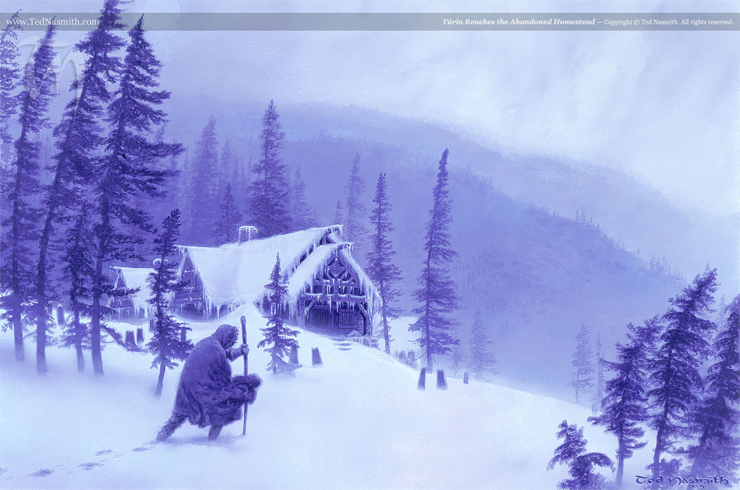
Morwen and Nienor are gone…and seem to have been for some time. Could Glaurung, the dragon whom Morgoth has jacked up with malice and evil power, have…fibbed?
So Túrin checks in with a neighbor he once he knew: Aerin, a kinswoman of Húrin’s who was basically like an aunt to Túrin, and used to sneak food to Morwen back when she was living as a single mom under Easterling oppression. But the problem is, even then, Aerin (EYE-rin) had been taken to be the wife of an Easterling—yes, against her will. That Easterling’s name is Brodda and Aerin is still stuck with him. He’s no important person among his own people, but Brodda’s a bully and has claimed all of the holdings of Húrin’s family. This doesn’t bode well for him with Túrin’s homecoming, though, does it?
No indeed. Well, an old servant of Aerin’s meets him and tells Túrin that his mother and sister had indeed departed Dor-lómin already. More than a year ago, in fact. But that’s not good enough. Where did they go? So Túrin, who’s slain scads of Orcs and even his best friend, is in no mood to ask nicely. He goes right into Brodda the Easterling’s house, his black-bladed sword in hand, and demands to know where Morwen has gone. Aerin comes forth and gives him that answer: Morwen and her daughter went to Doriath.
‘For the lands were freed then from evil,’ she said. ‘by the Black Sword of the south, who now has fallen, they say.’
Hearing this, Túrin finally realizes what Glaurung and his lies have achieved in sending him on this wild goose chase. Wrath overtakes him, as it often does, and he kills Brodda then and there, along with the other bystander Easterlings at his table. Now, Túrin is one of the First Age’s greatest warriors among Men, but he alone cannot take on all the Easterlings who occupy Hithlum, so he’s got to flee now that he’s slain these guys. And all the servants and serfs who were once Hador’s folk now have new troubles of their own—they will be hunted by the Easterlings. But Túrin departs Dor-lómin, leaving yet another mess in his wake.
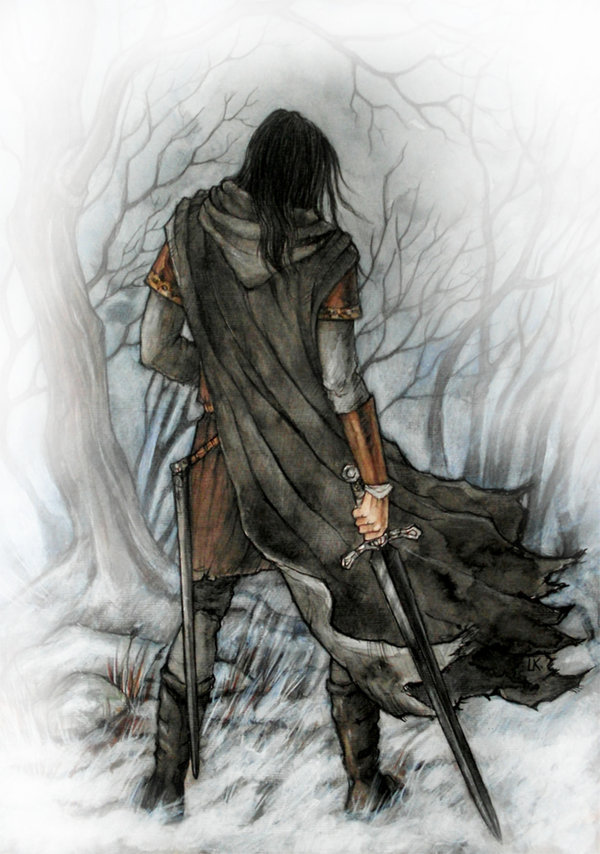
He’s not completely self-unaware. He realizes now that his efforts as Gorthol the Dread Helm (in Amon Rûdh) and especially the Black Sword (in Nargothrond) have had the effect of clearing the way for his mom and sister to go to Doriath. But now that he knows they went to King Thingol, there is nowhere else safer than inside the Girdle of Melian, so he decides to let them be. To “leave them in peace unshadowed for a while.” It’s fairly sound thinking, and given his track record for keeping those around him intact, it’s not the worst thing to just leave them alone for now. Yet, sadly, it also takes no account of the curse upon the family. What’s to say they will stay put?
So Túrin treks back into the Vale of Sirion, seeking Finduilas at long last. But it’s far too late; the trail is cold. He does come upon some warriors of Brethil; that is, the remnants of the Haladin, Lady Haleth’s folk, to whom Túrin does have some distant blood ties. A group of them are beset by the Orcs who Glaurung had kicked out of Nargothrond. Seeing this, Túrin does what Túrin does do best: he attacks the Orcs, killing and/or sending them running. The Men are freed and give thanks.
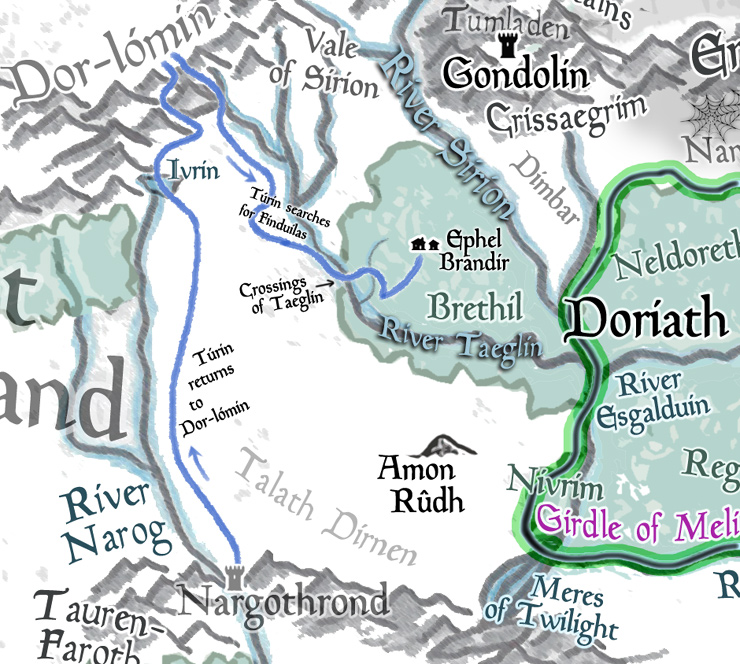
Naturally, introductions are order.
Pop quiz time! Does Túrin…
- give his name,
- use one of his other aliases, or
- make up a new one on the spot?
If you don’t know the answer, you haven’t been paying attention. Since he always wants to circumvent his infamy, he now calls himself…
Wildman of the Woods
For an intelligent (if unwise) Man raised among Elves, this is a pretty lazy name. Not exactly his most original. But whatevs, they accept it. Their leader gives his name, Dorlas, and he invites “Wildman” to return with them back to their homesteads. Wildman initially declines, saying he must find Finduilas, daughter of Orodreth. But sadly, there’s no need. Dorlas tells him that she is dead. In fact, this very band of hunters, ever allies to Elves (if aloofly, see below), were the ones who struck out against the Orc-host that sacked Nargothrond even as they’d marched their captives by the Crossings of Taeglin—that is, a ford where an actual road crosses the River Taeglin. In that assault, the Orcs immediately turned on their prisoners and slew them quickly so they could not be rescued.
Princess Finduilas, most likely considered the Orcs’ most valuable prisoner, had been singled out and “pinned to a tree with a spear.” Worse, as she was dying, Dorlas heard her say: ‘Tell the Mormegil that Finduilas is here.’ And these same Men, after that battle, placed her body in a burial mound, as Men do.
Grim as ever, Túrin-as-Wildman asks to be led to this mound. When he reaches it, he drops down and just lies there in a comatose grief. Although he can be thick as a brick and never considers the consequences of his actions, Túrin does feel their weight after the fact. Half his woes he brings upon himself, and he does suffers for it.
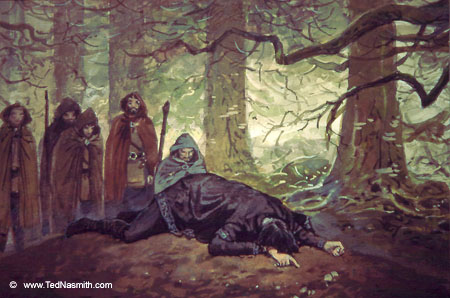
This somnolent and dramatic display, as well as the black-bladed sword in his possession, outs “Wildman” as both the Mormegil and the son of the legendary Húrin. The Haladin then pick him up and take him back to their settlement, which is located in a topographically higher region of Brethil. The current ruler and heir of the house of Haleth is a guy named Brandir, a man who “trusted rather in secrecy than in deeds of war” (uh-oh, not exactly the Mormegil’s style), who also happens to be somewhat physically disabled, or “lame from birth.” Brandir takes pity on the Man, even though he’s rightly wary of him—the reputation of the Mormegil isn’t exactly one of caution and subtlety. I mean, didn’t Nargothrond get wrecked with the Black Sword as its captain? Ah, but who’s to say? Rumors abound, and the First Age is not exactly Middle-earth’s age of mass communication.
Túrin is nursed back to health. Thinking that he really ought to stay in Brethil now, he decides he can “put his shadow behind him” and begin a new chapter in his life by forsaking his past. Which…really, Túrin? Somehow he thinks he hasn’t tried this before. I kind of want to say he just needs a good friend to give him wise counsel…but, honestly, that probably wouldn’t work. Either the advice would go in one ear and out the other, or he’d end up killing that friend in a freak…let’s say whittling accident. Probably both.
In any case, he boldly declares this “new” approach to life by giving himself…you guessed it. A new name.
Turambar
Choosing a name that’s Quenya for “Master of Doom,” Túrin seems like he’s trying to own the portents that surround him. But it’s really just new wine in old bottles. He asks the people of Haleth to basically pretend that he was never anyone other than a dude named Turambar who lived here among them. He wants help in his pretending. Again.
One aspect of his life that he can’t shake off, though: his need to kill Orcs. It’s in his blood, and probably what he shares most in common with dear old dad. So he returns often to both the mound where Finduilas lays buried and the Crossings of Taeglin, the ford that gets the most Orc-foot-traffic in the region. This time, he does all his hunting with a bow and a spear, setting aside the sword formerly known as Anglachel (now named Gurthang), just in case it’s tied up with his crazy life. Maybe it’s caused enough trouble.
Now we jump back to Menegroth in Doriath, where Morwen and Nienor are still living in Thingol’s court. By this time, some of the survivors of Nargothrond’s ruin have brought word of its fall.
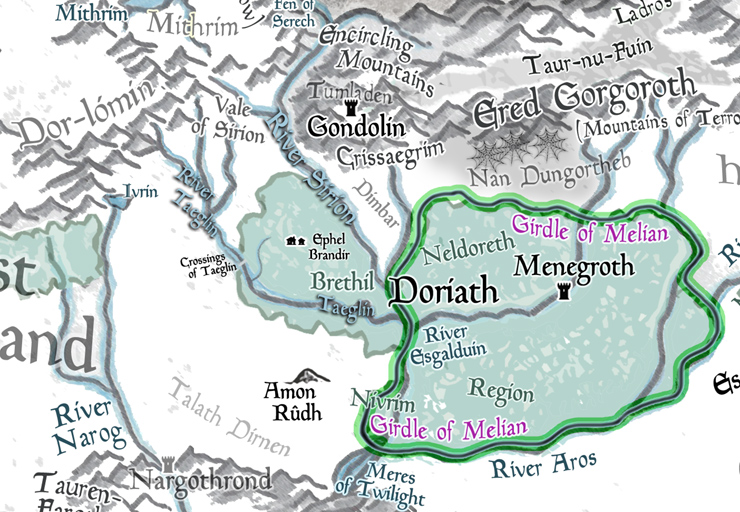
A few things in particular come to light, though they are shadowed by doubts and uncertainties:
- Morgoth’s forces have, for the most part, retreated back to the north.
- The dragon Glaurung has made the ruins of Nargothrond his lair.
- The Mormegil, once captain of that Elf-city, is either dead or stands enspelled by the dragon still.
- Oh, and the Mormegil is Túrin son of Húrin.
Morwen finally can’t take it anymore. She knows where her son might be now and wants to find him. Very understandable. She regrets waiting in Dor-lómin as long as she did. But it’s also kind of too little, too late. Is he alive or dead? She hasn’t seen her baby boy since he was eight years old! Thus Morwen does what is now de rigueur in the kingdom of Doriath and “refuses the counsel of Melian” when it is given to her—Melian’s counsel being to not go at this time, for to do so under these circumstances sure feels like playing into the hands of Morgoth.
But you know, in this, we can at least see that not heeding the advice of the Maia Queen, wisest being in all of Beleriand and probably all of Middle-earth, is not necessarily a sexist thing. Now we see that even noblewomen—fellow mothers with a child in peril, no less—disregard her when it matters most. Again, I like to remind myself that Galadriel is right there, seeing all this, for she’s been living in Menegroth as a close friend of Melian’s for centuries now, taking little part in the great deeds of the First Age, but surely taking notes. She’s an informed observer who will one day give guidance and leadership to many more still.
So Morwen rides out, exiting the Girdle of Melian. Now, Thingol is eager to find out exactly what’s become of Nargothrond, too, but he also isn’t crazy about his mortal friend heading off into such danger. So he sends Mablung of the Heavy Hand to go after Morwen to guard her journey and find out what state Nargothrond’s really in. And with him will go a group of his best march-wards. Mablung, it’s worth recalling, had once joined in the Hunt for the Wolf with Beren One-handed, Beleg Strongbow, and King Thingol; he’s a veteran and undoubtedly a high-level ranger.
Buy the Book
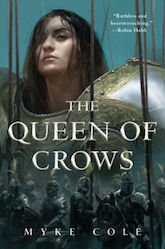

The Queen of Crows (The Sacred Throne)
Nienor had insisted on joining Morwen but had been denied. Now, having more sense than her mother, she intends to go anyway—hoping to persuade her mom to come back by putting herself in jeopardy. Being the daughter of Húrin, she doesn’t shy from this danger, so she pulls an Éowyn, kinda sorta, and disguises herself as one of the Elves in Mablung’s posse. It’s not a stretch, either: she’s tall like her brother, and just as he resembles an Elf, so does she.
By the River Sirion they catch up to Morwen and deliberate on the situation. Mablung tries but is unable to convince the Lady of Dor-lómin to return to Menegroth. She is acting much too “fey” now to listen to reason. (Note that previously, only Fëanor and Fingolfin had been described as fey…and look how they ended up!) Likewise, Nienor is also unmasked: heyyy, that’s no Elf! She’s just as stubborn as her mom and also refuses to go back, as well. Mablung, I have to think, is shaking his head at these bullheaded women of Hithlum. Better to chase the Wolf than reason with these two! At least with Carcharoth the goal and the means was clearer: kill the Wolf and try not to get eaten.
At this point, the whole company presses on together, heading south towards Nargothrond. Mablung is calling the shots now. They proceed cautiously when they get close, and the Elf sends his scouts ahead to make sure it’s even safe to approach the gates—
—but it’s totally not safe! Glaurung gets the drop on them. He may be lazing around Nargothrond and swimming through his hoarded treasure like Scrooge McDuck, but he’s not truly idle. Back on duty, the dragon assaults them with his trademark fire and fury right at the river. Now remember, dragons are walking biohazards in Tolkien’s world. Dragon + fire + water = “vast vapour and foul reek,” which blinds the whole company. They are scattered and confused.
The Elf-guards try to keep the women safe, and do their utmost to escort them swiftly away from this crisis, but unlucky winds blow the dragon-stink right after them. The sheer smell makes the horses go mad, so much that some of the Elves are killed as their steeds dash themselves into trees. The rest are simply carried uselessly away.
Morwen nearly disappears from history at this point. Wherever her maddened horse carries her, we’re not told, and no one in Doriath ever hears word of her again. She’s just…gone.
Nienor, however, is thrown from her steed but is otherwise unhurt. She tries to find Mablung or her mom or any of the others, and ends up walking up a hill for a better vantage…
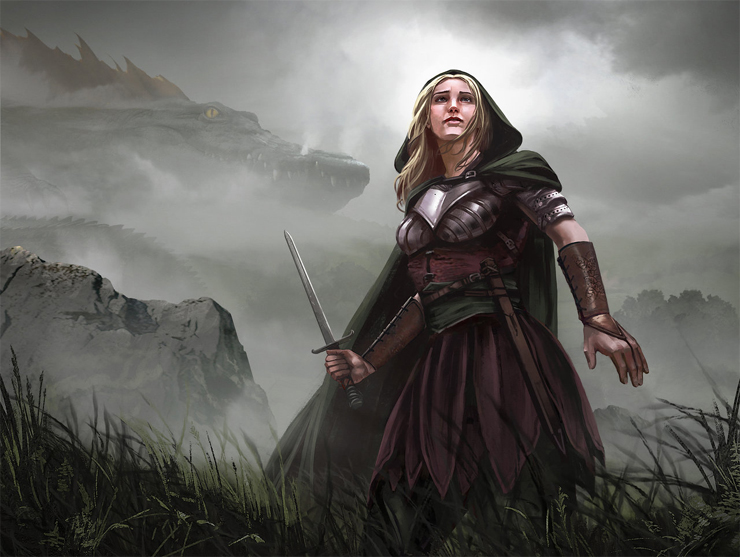
And falls right into Glaurung’s crosshairs. He pulls the ol’ you-thought-you-were-looking-west-but-you’re-actually-looking-right-into-my-eyes trick. Gets ’em every time!
Glaurung had been crouched there, waiting for her, and now the young woman ends up fully exposed to his terrible spirit-eyes. Nienor is as spellbound as her brother had been on the bridge of Nargothrond. She tries for a while to battle him through sheer willpower—which is no small thing, being a proud daughter of Húrin. But he wins the contest.
In the full tale—as told in The Children of Húrin—Nienor and Glaurung also have a brief exchange, in which she verbally stands up to him. He asks her what she seeks. She names Túrin, who he then calls “craven,” and in response she boldly claims that (1) “the children of Húrin at least are not craven” and (2) that “We fear you not.”
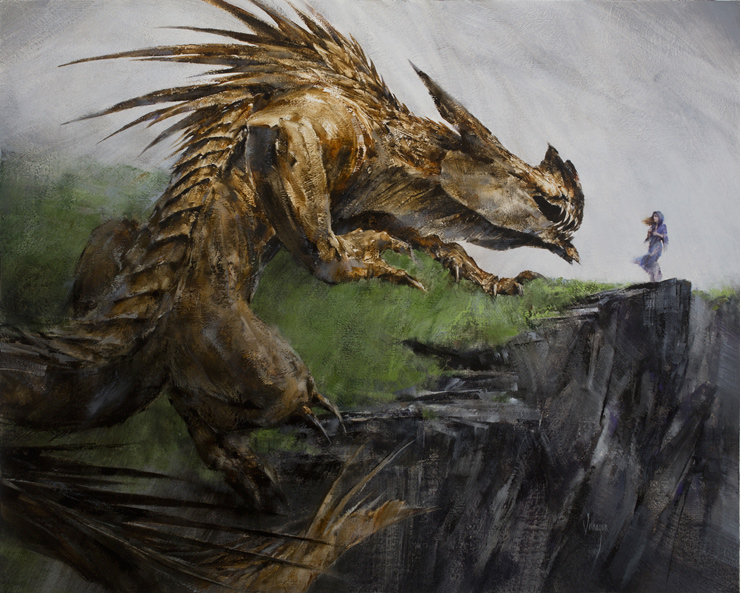
But see, even this is a perilous misstep on her part, as it reveals precisely who she is, where before he did not know for certain. To be fair, it’s not like Nienor’s had any experience with dragons or with the deceits of Morgoth. And of course being a Urulókë, his ego can’t stand the idea of her not being terrified of him. So he’s all, you should fear me, blah blah, “For I am Glaurung!”
and he laid a spell of utter darkness and forgetfulness upon her, so that she could remember nothing that had ever befallen her, nor her own name, nor the name of any other thing;
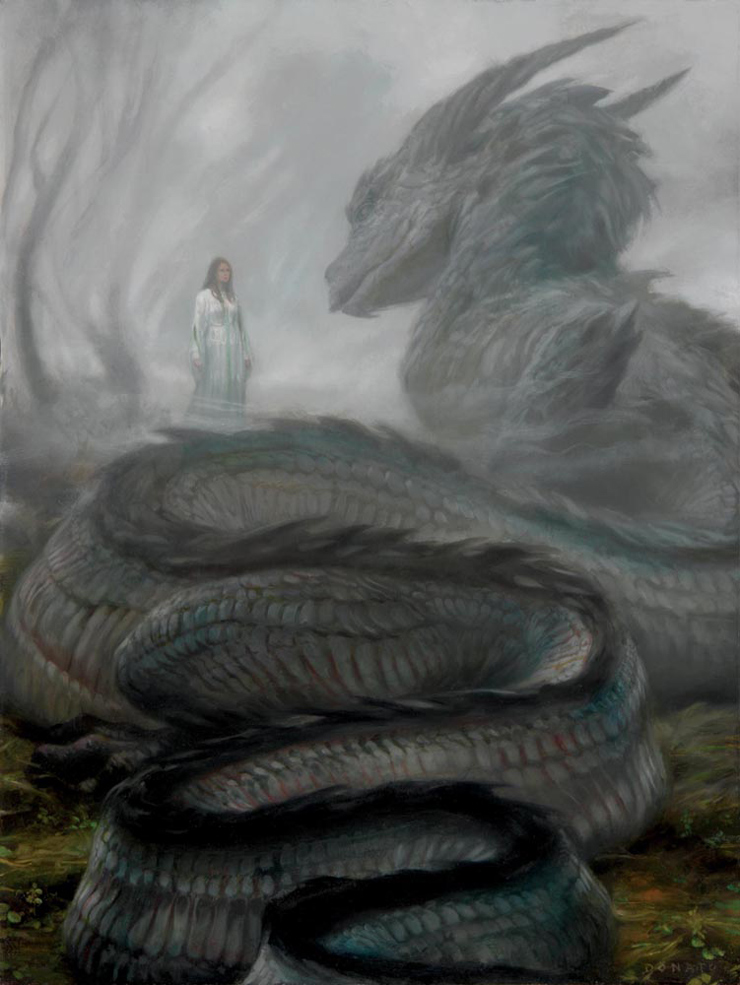
Glaurung has cleared Nienor’s history, emptied her cache, deleted all her cookies. Did a total factory reset on her mind. I mean, yeah, he could easily devour her or burn her up. But right now that’s not his style, nor would that accomplish the variety of woe Morgoth has prescribed for this family. He’s a cunning dragon, the first of dragons, and has power and evil in him that the Dark Lord had placed there.
So with that, Glaurung just crawls off, leaving her there, bereft of language, identity, even most of her senses. She cannot see, she cannot hear. She’s stricken dumb.
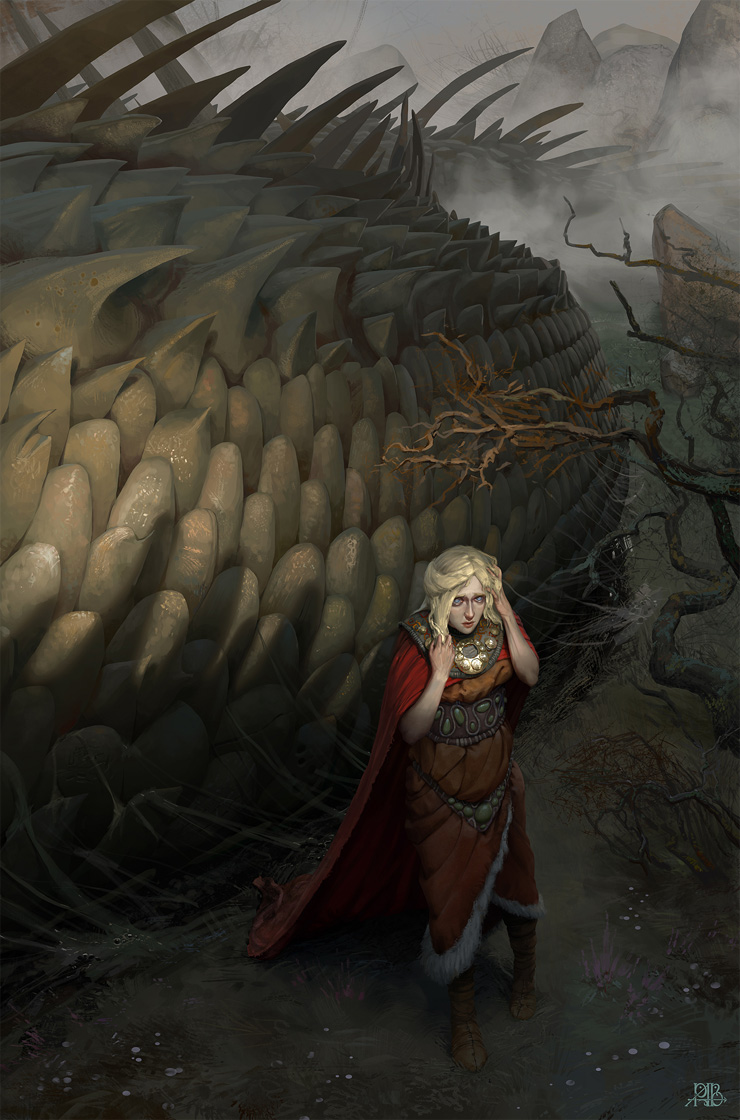
Mablung, after doing his own searching, eventually finds her! But Nienor might as well be an automaton, a ghost of her former self. She follows slowly when he takes her hand but she’s got zero agency now. There is no trace of Morwen anywhere, and he encounters only three of his own march-wards. This adventure has been a bust. Oh, to be hunting the Wolf instead! The five of them begin the long and slow journey back home, for Nienor has never been so vulnerable. It’s not explicitly suggested, but I’m betting if they get her to Menegroth, Melian would be able to help the girl. The Maia who can tell Ungoliant to get lost has got to be one who can strip away a dragon-spell.
When they finally draw near to the border of Doriath, Nienor succumbs to sleep for the first time since her meeting with Glaurung, which is a good thing. It sure beats creeping everyone out with her haunted, unseeing eyes. Well, they all need rest, so Mablung has them stop to camp. Which is really just the worst timing for an Orc-band to show up.
You know, this all sucks for Nienor and the Elves, but it’s also weirdly relieving to see that such foul misfortune can and does happen to people other than just Túrin. In this case, the curse of Morgoth seems to be flaring up around her. And it’s in the tumult of sudden battle that Nienor is roused. Suddenly she can see and hear again, but that’s all. Spooked by the Orcs, she jumps up and runs in terror. The Orcs chase her, but the Elves chase them and eventually slay them.
But they can’t find Nienor. Not even expert Mablung can track her down, though he tries for a long time and eventually has no choice but to return to Menegroth and report the very unsuccessful let’s-check-out-Nargothrond mission they’d all embarked on. In The Children of Húrin, he beats himself up over it, but Thingol and Melian both tell him otherwise. The queen even points out that there was nothing more he could have done, being “matched against a power too great…too great indeed for all that now dwell in Middle-earth.” She knows losing Nienor must be Morgoth’s doing, and seems to count herself as being no match for it.
Meanwhile, Nienor has become like a feral creature of the wild. In madness, she has shed her own clothing, and runs faster than a deer. Wait…naked and being compared to an even-toed ruminant of the woods sounds familiar, doesn’t it?
If the Men of Hithlum are so wild and fell, of what sort are the women of that land? Do they run like deer clad only in their hair?
Thus spoke Saeros back at the real start of the troubles of the children of Húrin. Dang those Elves and their bizarre foresightedness, even in mere jest!
Eventually she passes out. But when she wakes again in the morning, she beholds the world with childlike wonder. Everything seems new to her. She still has no language, no words, but she can see and hear, and she is aware of some nameless darkness behind her that seems in steady pursuit. Lacking the means to hunt, or any knowledge of how, she wanders in hunger towards the tall trees of Brethil, that big forest west of Doriath. At least she knows she can find shelter there. Frightened by a powerful storm that rises up from the south, she ends up rain-lashed and vulnerable, cowering on the ground. Not just any ground, but a man-made mound of earth.
And so it’s right there, on the very burial mound where the body of the Elf-maid Finguilas has been interred, that Turambar the Master of Doom—who we’re all pretending isn’t Túrin—comes upon this young woman lying on the ground in her birthday suit. He’s out hunting with the Haladin he’s been living with. Remember, these aren’t outlaws, but Men of the house of Haleth. They’re based out of a settlement called Ephel Brandir, a big stockade named after its ruler.
Of course, Turambar doesn’t recognize the fair maiden. Why would he? He’s legit never seen her before in his life. But he is “stricken to the heart” when he looks upon her.
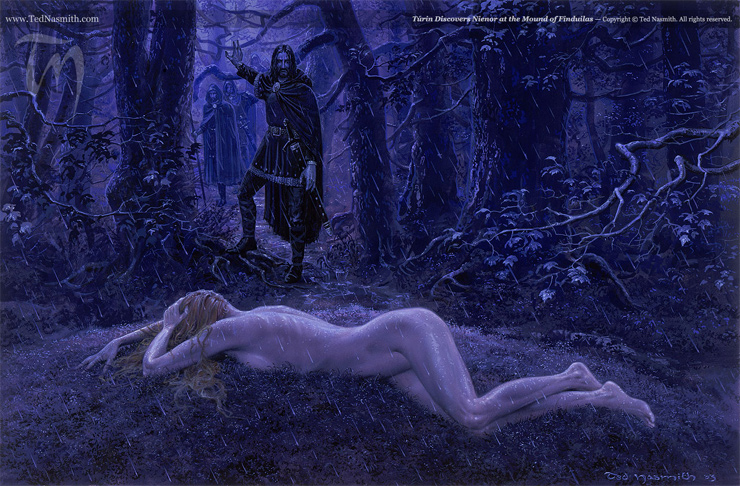
Which… uh-oh. Anyone smell the curse of Morgoth? It’s getting creepy up in here.
But Turambar isn’t a monster. He doesn’t just gawk at her. He’s quick to cover her up with his cloak and carry her to a nearby outpost. Gets her warm and fed. When she comes to and looks at him, she feels safe. Despite the spiritual darkness that seems to shroud her, she sees in this man—this very handsome man—“something that she had sought.” When he tries to communicate with her and ask her name, she cries in frustration, as she’s unable to properly understand him or know what’s even being asked. Turambar doesn’t mind, he’s in no hurry. In fact, he’ll give her a name. Why wouldn’t he? That’s, like, his whole thing! He loves coming up with names, this guy.
She thus becomes Níniel, which means Tear-maiden. And she can speak again, but she has to relearn language itself. She doesn’t have the mind of a baby, only the education of one. She has to start over. And so with Níniel in tow, the Turambar and the Haladin head back toward Ephel Brandir.
On the way they pass by a waterfall called Dimrost, a.k.a. the Rainy Stair, a scenic cascade formed where a smaller river, Celebros, flows down into the River Taeglin. This, in turn, commands a view of a nearby gorge. In view of that high precipice, Níniel has a mysterious panic attack. So ominous are her spasms that the Elves later rename the place—because Elves—Nen Girith, the Shuddering Water. In this moment, we don’t see why she has this reaction, but we’ll find out later. Remember this view, this gorge.
Anyway, her episode leaves her faint and sick. So they carry her on from there.
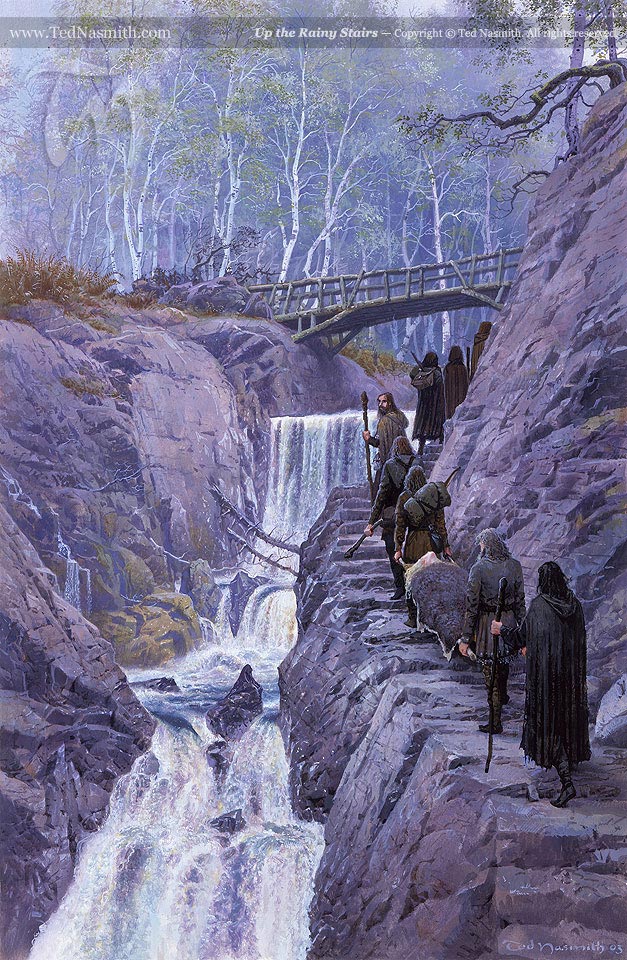
When they reach Ephel Brandir, the young amnesiac is well cared for. Time goes by and the land is uncharacteristically peaceful for a while. Orcs have become scarce. Turambar actually relaxes. The Haladin’s official leader, Brandir with the lame foot, falls in love with Níniel. But she in turn has, quite unfortunately, fallen for this “Turambar” fella. History repeating itself (à la Finduilas and Gwindor), it seems, but with Men, rather than Elves. Yet this time, Turambar falls for the girl who’s fallen for him. Ooof.
Turambar then actually proposes to her. Yeah, this guy is actually trying to find some happiness in the crapshoot that has been his adult life, but though she shares his feelings, Níniel does stall for a time. Something about it troubles her. Brandir is jealous, but he also forebodes this development. He counsels her against marrying Turambar. Moreover, he tells her his real name: Túrin son of Húrin. But…but…
though she knew not the name, a shadow fell upon her mind.
Something deep inside her is warning her, but she can’t parse out her feelings of confusion. Glaurung’s spell of forgetting is a real son of a bitch.
It’s a shame that the Valar are so hands-off with Men. Because this sure seems like a good time for Ulmo to send some river-borne dreams to Níniel. Or even to Túrin, right? Maybe a copy of the Húrin family tree could wash up somewhere with a couple of choice names circled on it…. But no, the Valar have no traction among Men. Look at what happened in Nargothrond. The warnings of the Lord of Waters were ignored. It’s doubly a shame that the Haladin are so insular—which they were even in Haleth’s day—because this would also be a great time to get a visit from an Elf—any Elf—of Thingol’s court. Someone who would recognize Níniel and know her real name. Alas, none of that happens.
Three years go by, and once again there are rumors of Orcs moving along the borders of Brethil. Turambar asks Níniel to make up her mind about getting hitched. She’s got two choices.
- Marry him and he’ll stay there with her and give up going to war; in fact, he’ll only go and fight if their home is directly attacked. But no more going out on wild Orc hunts.
- Don’t marry him, in which case he’ll head out to secure the borders now. Who’s better than Turambar at slaying Orcs?
While he may seem like a jerk throwing down this ultimatum, pushing her towards something she doesn’t want, that’s not really the case. She does want to be with Turambar. There’s just that pesky shadow upon her mind…but hey, what’s the worst that could happen?
And Níniel took him with joy, and they were wedded at the midsummer, and the woodsmen of Brethil made a great feast.

Ooof, all right. It’s done. It’s happened. Damn that Glaurung. Damn Morgoth. And maybe, damn Túrin for not hiring a PI to run a background check on his amnesiac girlfriend. Even in the expanded tale, I don’t think he does much nosing around, no trying to solve the Case of the Girl With No Memory. I mean, she couldn’t have just popped out of the ground with no backstory, right?
Anyway, they are happy for a time, happy in the bliss of ignorance. Actual joy, messed up as it may be, is achieved by the children of Húrin for a little while. But before a year goes by, trouble brews. Glaurung has sent out from his Nargothrond dominion more Orcs to harass the region. Oh, sure, now he wants Orcs around to command.
But Turambar keeps his word to his wife and stays at home, even as the Orcs start to press in. Thing start to go south for the Men of Brethil at their borders. Dorlas, the leader of their warriors, even “upbraids” Turambar for this—that is, he rebukes the guy for not helping to defend the land that took him in. Turambar, being proud, can’t just let that stand. He is roused to action, and agrees to go out and chop some heads—just for a little while. He even takes up Gurthang again, and he leads the Haladin warriors to victory; they mop the floor with the Orcs.
A few must get away, though, because they bring word to Glaurung that the Black Sword is now active in Brethil. Which places Túrin back on the map. And with that knowledge, the father of all dragons devises “new evil.” Out with the old, in with the new!
And then, a while later, Níniel becomes pregnant. So Turambar is going to be a father! She’s going to be a mother! But this makes her sad, quite possibly for a variety of reasons, but most likely it’s that darkness that clings to her, like a wraith of her former self that she cannot see.
And soon after, rumors start going around Ephel Brandir that Glaurung has left Nargothrond. The Haladin hope that he’s just heading back to Angband and will pass them by, but can they risk that? By this time, Turambar is calling the shots, and no one’s listening to their actual leader, Brandir, anymore. This is, of course, some tragic déjà vu. Túrin “Turambar” clearly has problems with authority and has a knack for just taking charge of whatever group he’s part of. On the one hand, it’s confidence and decisiveness—legitimate traits for a leader—but his initiatives are always stymied by pride. Can you imagine if he ever met Fëanor? I mean, on this side of the Halls of Mandos?
So Glaurung is by this point loitering outside the borders of Brethil, dragging his toxic ass near the River Taeglin. It’s clear he’s not going away; in fact, all signs point to him coming in and burning the hell out of Brethil. So the Haladin look to Turambar. What to do? He at least knows better this time around to not just lead the warriors out in force. Only by “cunning and good fortune” could they possibly succeed that way. Glaurung has flame-broiled Noldor straight-up; Men would just be so much kindling.
So he tells them that he will go and seek out the dragon alone, and try to take Glaurung unawares. Quite a change from his old methods. Hey, he’s learning. He’s Turambar, right, Master of Doom? He’s trying to make his own fate. And maybe, from his point of view, he can’t be blamed for having some hope. He’s been miserable for so long, but now he has a beautiful wife who loves him and now they’re gonna be parents. A whole new chapter surely lies before him. Maybe he thinks his fortunes have changed somehow. Maybe with his last renaming he finally outran Morgoth’s alleged curse.
He just has to deal with the dragon problem. So he asks for volunteers to come with him, but receives only two: Dorlas and a guy named Hunthor. Dorlas chews out his people, especially Brandir, for their cowardice. Then they set out, but not before Turambar says farewell to Níniel. The next time they meet, the dragon will be dead: that’s the plan. But she is sorrowful, foreboding something evil. He is far more optimistic. Well, he has to be, at this point. And speaking of points, he’s definitely got his trusty old sword, Gurthang, for this errand. So Turambar, Dorlas, and Hunthor set out to find Glaurung, a three-man team of drake assassins.
But Níniel isn’t content to just stay behind and wait to get bad news. (Just as how, in a former life, she would not be restrained and so followed after her mother.) So she sets out a ways behind Turambar, and a bunch of the Haladim go with her. She’s courageous, and it gives them the courage. Brandir is still against all of this, and in bitterness, he renounces his leadership altogether. Yet he skulks after them but can’t keep up.
Meanwhile, Team Dragonslayer discovers Glaurung hanging out on the western side of the Taeglin, aiming to stretch his length across a narrow point in the gorge because it’s too wide a river for him to just step over. This spot is called Cabed-en-Aras, or Leap of the Deer, because once a deer jumped across to escape a Haladin hunter—and frankly, all it takes is one incident for Elves to slap a name on it.
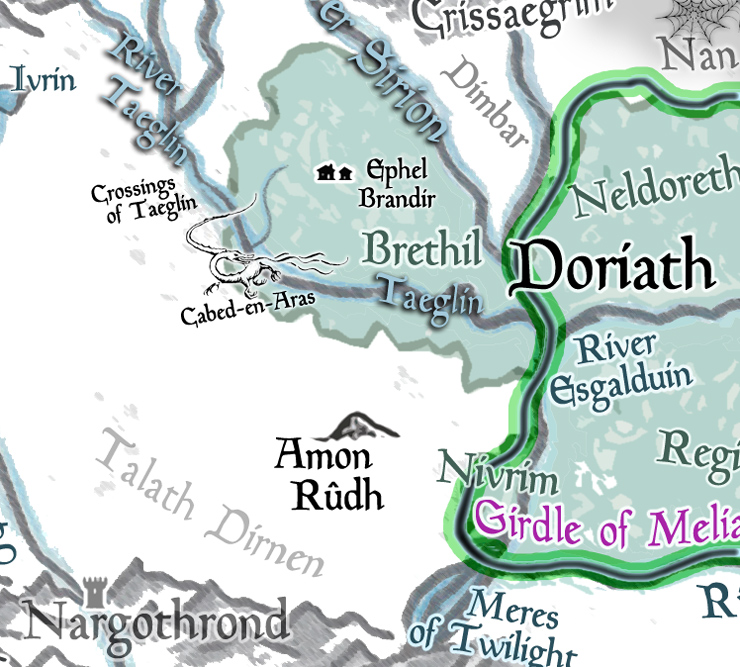
This is where Turambar intends to strike. See, Glaurung first has to get his business side (head and forelegs) over that gap, then he can heave his party side (hindquarters) over as well. And that means for a moment his softer underbelly will be exposed. Now it might be obvious, of course, but it’s worth pointing out that dragons in Middle-earth still don’t have wings! Even though some of his descendants will, Glaurung is the first dragon. He’s Dragon 1.0, as Corey Olsen, the Tolkien Professor, declares him. He might be mighty as spirits go, and given that Morgoth has put some of his power into the father of all dragon, he’s no joke. But as dragon design goes, the best is yet to come. Glaurung can blast down the Doors of Felagund and burn up a host of Elves, but a big expanse of water? Clearly he doesn’t like to swim. Thus he’s come to this narrow gorge where the two sides of the river are close enough that he can just stretch-jump across.
I assume, at this point, that Turambar whips up a quick sketch of his plan.
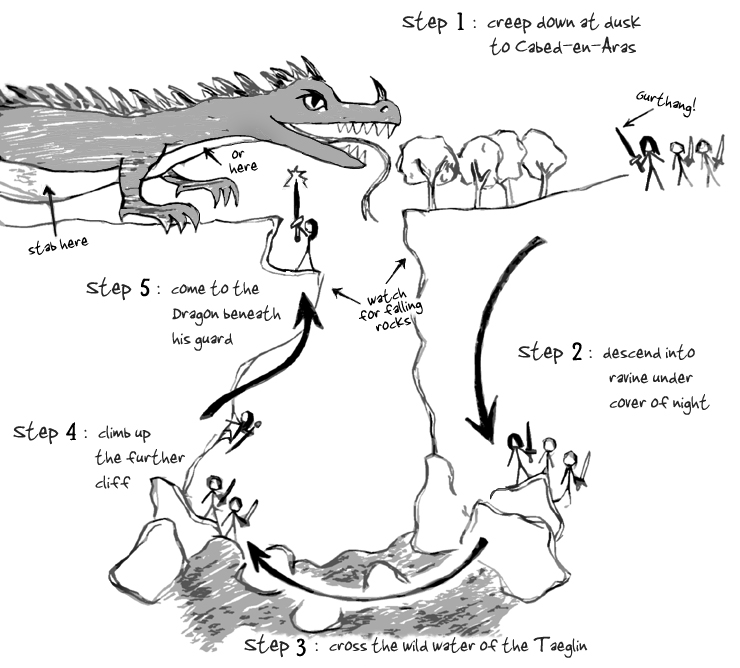
Anyway, this is all happening within sight of that waterfall, Dimrost, where several years before Níniel had her strange, shuddering episode. What portent lies in this place? Well Turambar’s plan is creep up the gorge from the bottom and stab Glaurung from below; not an easy climb, but it’s the only feasible plan. And it’s crazy enough that it just might work!
At dusk the three Men ready themselves for the moment of Glaurung’s crossing, but Dorlas chickens out and retreats in the woods, full of shame. Hunthor stays true, but just as Glaurung begins to make the crossing—totally unaware of the sneaky mortals—he starts with a great blast of fire to burn away the trees on the opposite side. The land shakes, the heat nearly overtakes the Men, and a big rock is dislodged in the tumult. The falling stone takes Hunthor right on the head, and he’s instantly killed and dropped into the river below. Ill luck indeed to be near Turambar.
But Turambar’s gamble still looks like it just might work, though it takes all his grit to make it happen as he scrambles up the wet rocks: If it doesn’t work, he’s toast. Turambar reaches a ledge just beneath the stretching dragon, and he draws out Gurthang, the Iron of Death. And it sure feels like in that moment, he should be saying: “Black blade! I have saved you to the last. You have never failed me and always I have recovered you. I had you from my best friend and he from of old. If ever you came from the forges of a Dark Elf in Nan Elmoth, go now and stab well!”
But no, that would be silly. There’s no time for a speech. Túrin Turambar drives the sword “with all the might of his arm, and his hate” right up into the more vulnerable belly of the dragon. Right to the hilt. Thus is Túrin truly the “bane of Glaurung,” as the narrator tried to spoil for us quite a while back.
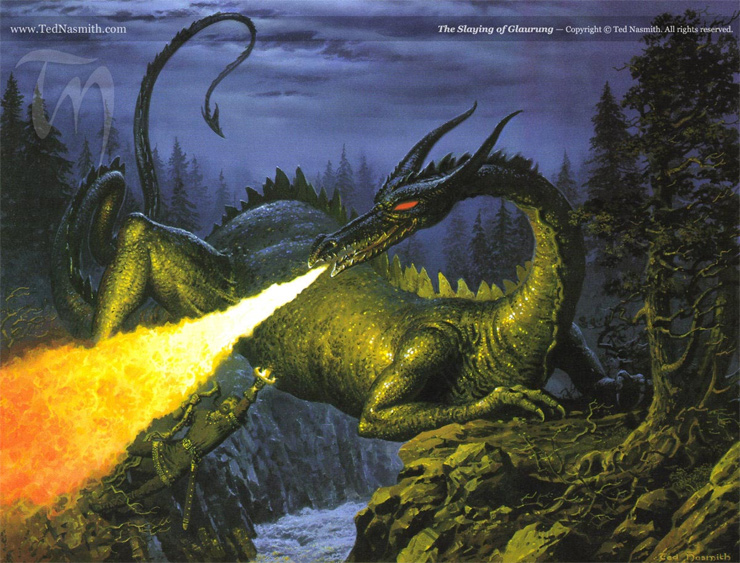
Well no one told Glaurung that! He sure hadn’t seen this coming. Perhaps he, too, was stricken with overconfidence and hubris. And look, no matter how bad things turn out for Túrin, he’ll still be given props by Elrond one day, and songs are made in memory of him, whereas everyone is going to—rightly—talk shit about Glaurung forever. It ultimately sucks to work for Morgoth. Sucks real bad.
Glaurung finishes his climb across the gorge, carrying the embedded Gurthang with him, but then he thrashes about, spraying fire willy-nilly, generally freaking out because he’s going to die and maybe he hadn’t gotten all his affairs in order. When he finally lies still, dying but still not quite dead, Túrin Turambar makes yet another poor decision. And this time no one’s around to hold his mead. He wants to get his sword back, and isn’t content to wait—Gurthang isn’t going anywhere anytime soon, right? Yet he feels the needs to mock his foe. Like father, like son, I suppose.
Turambar walks up to Glaurung and he’s all like, ’Sup, dragon? Or rather:
Hail, Worm of Morgoth! Well met again! Die now and the darkness have thee! Thus is Túrin son of Húrin avenged.
Of course, he’s congratulating himself much too soon. When Turambar draws Gurthang back out of the dragon’s body, with it comes a spurt of venomous black blood that splashes him on the hand. Glaurung opens his eyes and with one last little bit of malice his glare hits the Man like a blow to the head, and down he goes. Meanwhile, the venom of the dragon’s blood overtakes him and Turambar falls into a deathlike slumber.
Meanwhile, Níniel and the Haladin are nearby now, frightened because they mistook the bellows of Glaurung to be the dragon’s triumph. She shudders again by that “Rainy Stair” waterfall of shuddering, feeling that familiar dread creep over her. Which is when wretched Brandir limps up, thinking to whisk her away—if Túrin Turambar is dead, then maybe he and Níniel can find some kind of life together far from here. But it doesn’t work. She refuses to go with him, instead seeking out her husband, whatever his fate may be.
She follows the river until she finally comes upon the scene of ruin.
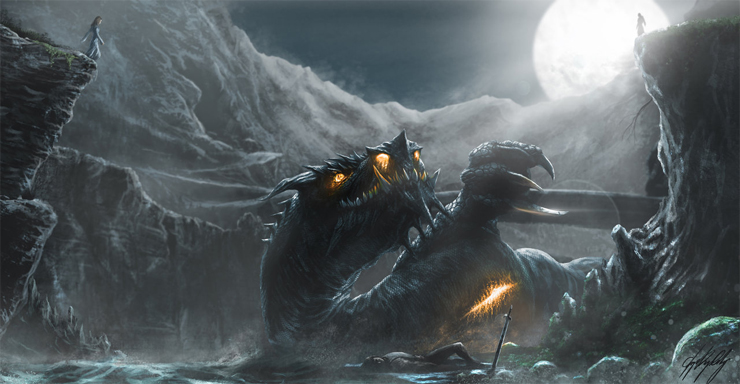
Glaurung is sprawled out. Turambar lies nearby, stricken. Dead? She hurries to him, washes his burned hand with tears and wraps the wound in a torn-off piece of her clothing, and tries to wake him. But it’s no use, like Juliet looking upon a supposedly dead Romeo. That’s when Glaurung stirs one last time. This is his death speech, his fell swan song. He’s either going to make a lewd joke or he’s going to say something that hurts her feelings. He’s all about hurting others’ feelings.
He calls her not Níniel but Nienor, daughter of Húrin, then rattles off something about being glad she finally got to find her…brother! Then he figuratively kicks Túrin while he’s down by calling the Man a bunch more names again. Because that guy just can’t have too many names. But Glaurung finishes his hurtful words to the pregnant Nienor with a real stinger.
But the worst of all his deeds thou shalt feel in thyself.
Some things were already cringe-worthy up until now, but this moment is as cruel and tragic as it gets, since the dragon is now referring to the unborn child inside her, a product of unknowing incest. Then Glaurung dies, speeding his evil spirit to wherever in Arda it came from, or maybe to some worse fate. He was a very Bad Dragon.
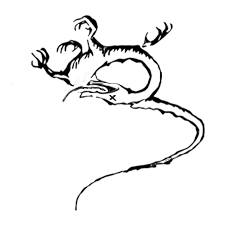
But Glaurung’s death unravels Nienor’s mind, unspools all that dreadful darkness, and utterly banishes the spell he’d placed upon her. Now she remembers everything, up to and including marrying her brother, Túrin son of Húrin, and some other stuff that’s now grim indeed.

Nienor is understandably horrified. First she cries a desperate farewell to Túrin, who she calls “twice beloved.” As icky as this whole situation is, it’s worth understanding that she recalls both halves of her life now: yes, she was the sister of Túrin and even though as his sister she never met him, she loved him still. She may have grown up idolizing him, hearing all about him first from Morwen then later from Thingol and Melian. But she can also recall knowing him not as her brother, but as a wife who shared her life with him in a short time of joy. And as an expectant mother.
But that’s little consolation now.
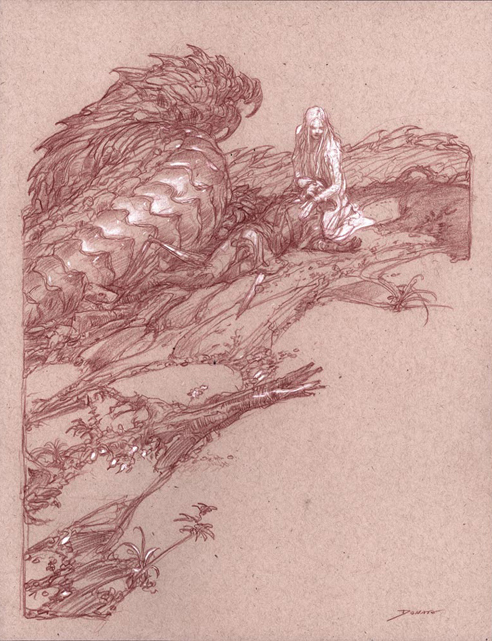
She then does what’s proven to be a family trait: she runs. Lame Brandir has watched this unfold from nearby—had heard Glaurung’s revelation—and though he tries to stop her, he can’t possibly catch her.
Nienor runs to the same gorge where Glaurung had been gutted. The same precipice where the waterfall Nimrost looks upon, where as Níniel she once stopped and had a shuddering fit—a dark premonition of this very moment. Which, to me, ultimately creeps me out more than anything else in this chapter. It’s philosophically fascinating.

and coming to the brink of Cabed-en-Aras she cast herself over, and was lost in the wild water.
Her body is never recovered. Nienor and her child are lost utterly to the World—and have probably moved into the Circles Beyond it. Brandir, who witnessed this, turns away, as do all. The site becomes a haunted place and it is—yes, of course—renamed. Formerly the Leap of the Deer (even that name being a premonition of this moment), now it is the Leap of Dreadful Doom.
Now comes all the fallout of these terrible developments. Brandir comes upon Dorlas—with whom he has some bone to pick—and manages to slay him there in the woods. He returns to the Haladin and reports on the respective deaths of Glaurung, Turambar, and Níniel, and then relays precisely what she had learned that made her leap to her death: Níniel is Nienor, Túrin’s own sister. He says nothing about Dorlas.
Of Turambar’s death Brandir dares to call “good tidings.” And then he gets to have one of those “He’s standing right behind me, isn’t he?” moments. Because it turns out Turambar’s death was fake news, as the Man himself comes walking up. For a moment they think he’s a g-g-g-ghost… But he had simply awakened from his Shakespearean nap of misunderstood death. He sought everyone out, confused by the state of his awakening. Who had tended his hand? He demands to know where his wife, Níniel, is. Brandir says she is dead; she threw herself over the gorge.
But Brandir’s information has become suspect, and Turambar gets wrathful. Seeing where this is going, Brandir tells all: to Turambar’s face he tells him that he overheard Glaurung in his final moment, of Níniel’s true identity as Nienor daughter of Húrin, and that Túrin Turambar “was a curse unto his kin and to all that harboured him.” And that’s the last straw for the son of Húrin. He screams that Brandir’s words are false and right in front of everyone, he slays him with Gurthang. With this act of straight-up, cold-blooded murder, he’s finished with the people of Brethil. He then runs to the sacred mound where Finduilas had been buried. It’s the closest thing to a safe space for him, which is grim indeed, considering it’s a place of sorrow.
Here he reflects on everything, not knowing what to believe, unsure where to go next. And it’s here that Mablung and a group of Elves find him. At last. And in one of those rare moments, someone is glad to see Túrin and he tells him so. It’s only a short-lived balm on his soul, perhaps, because at Túrin’s prompting, Mablung tells him what he knows about Morwen and Nienor, and how they met Glaurung at Nargothrond; Morwen was simply lost, while Nienor fell into a “spell of dumb forgetfulness” at the dragon’s behest. Not all of Brandir’s fake news was fake, after all.
Túrin, now perceiving the full horror of Glaurung’s deception, and Morgoth’s curse, and his own crimes, retorts with bitter words. Then he pulls a Túrin, fleeing again one last time. Mablung and the Elves are left standing, confused, and try to follow him. Túrin reaches the gorge and looks upon the roaring waters. He’s at the end of his tether. He’s got nothing left. He didn’t burn the candle at both ends; he cut the goddamned candle in half.
Now, I think it’s very easy to rag on Túrin, and there’s no question that he’s brought misery and ruin to a lot of people. It was never his intention, and from The Silmarillion and from the full tale provided elsewhere you can see he is possessed of pity, and a sense of justice. Even kindness at times. But it’s always wrapped up in chains and bloody decisions and tempered by the fact that an evil ex-Vala does have it in for him.
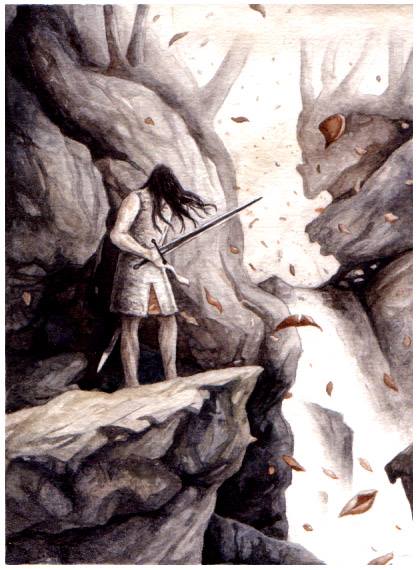
Whenever I reread this final deed—the act of a noble warrior who lost the will the fight—I also like to remember that Túrin was a boy once. He knew Laughter before he knew Mourning. He had a stern yet strong mother who he took after. And he had a father who went off to war when he was only eight years old. There is a brief scene early in The Children of Húrin when the family is gathered together for the last time. Húrin is about to ride off to the Nirnaeth Arnoediad, which will be his point of no return. But right then they still have hope, and expect to return to enjoy a midwinter feast and a “fearless spring after.” Húrin picks up his little boy and puts him on his shoulders, then calls out to the gathered warriors of Dor-lómin:
‘Let the heir of the House of Hador see the light of your swords!’ And the sun glittered on fifty blades as they leaped forth, and the court rang with the battle-cry of the Edain of the North.
But now Túrin, a thirtysomething Man who is accounted as one of the greatest of the First Age, slayer of the first dragon of Morgoth (and probably thousands of Orcs), now beseeches his black-bladed sword, Gurthang. He asks it if it will take his life, and slay him quickly. And in a cold voice it answers him, either in actuality as some vestigial remnant of its maker, or maybe just in his emotionally-haunted mind:
Yea, I will drink thy blood gladly, that so I may forget the blood of Beleg my master, and the blood of Brandir slain unjustly. I will slay thee swiftly.
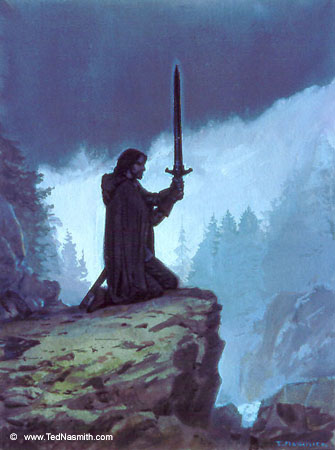
And that’s all he needs to hear. Túrin Turambar, a Man of many names, friends, loves, and curses, places the hilt to the ground and casts himself upon the blade. Ending his own life. Game over.
Everyone thinks Tolkien’s is all dei ex machina and happy endings. Well, not this time. No Eagle swoops in to scoop up the sword first.
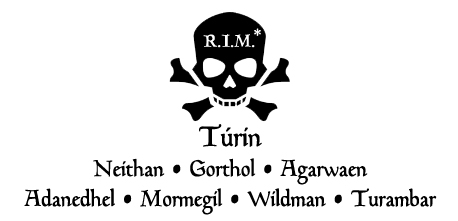
The company of Elves comes upon the scene soon after, look upon Túrin, and they grieve. The lives of mortal Men are so short to the Elves, but shorter still when violence takes them. All the worse when it’s self-delivered. Mablung feels especially mournful for having played a part in the doom of Húrin’s kids. He declares that the tidings that he brought “have slain one that I loved.”
Some readers may wonder why Túrin gets named by Elrond in the list of First Age heroes and Elf-friends. I mean, yeah, Túrin stopped Glaurung, who otherwise would have totally would have gone on to wreak a hell of a lot more death and misery unchecked, starting with the forest of Brethil; armies couldn’t bring him down. But Túrin seems chiefly responsible for the ruined lives of a bunch of other people. And yeah, I suppose he is…along with the supernatural curse he rode in on.
But he doesn’t go down in the history of Middle-earth as a monster. He goes down as a hero, or one who tried to be, and as someone who was loved anyway. Mablung has it right. Think of it this way: Have you ever lost someone you loved but didn’t always agree with in life? Someone you actually fought a lot with? As the years go by, it’s easier to remember the good qualities, the reasons you loved them, and harder to remember the bad stuff. You usually forgive the bad, even if you don’t fully forget it.
In the aftermath, Túrin’s body is placed in a mound right where he died, along with the shattered remains of Gurthang, which broke at last. In a tombstone upon it the Elves of Doriath carve, in Sindarin, Túrin Turambar, Bane of Glaurung and then both of Nienor’s names below it.
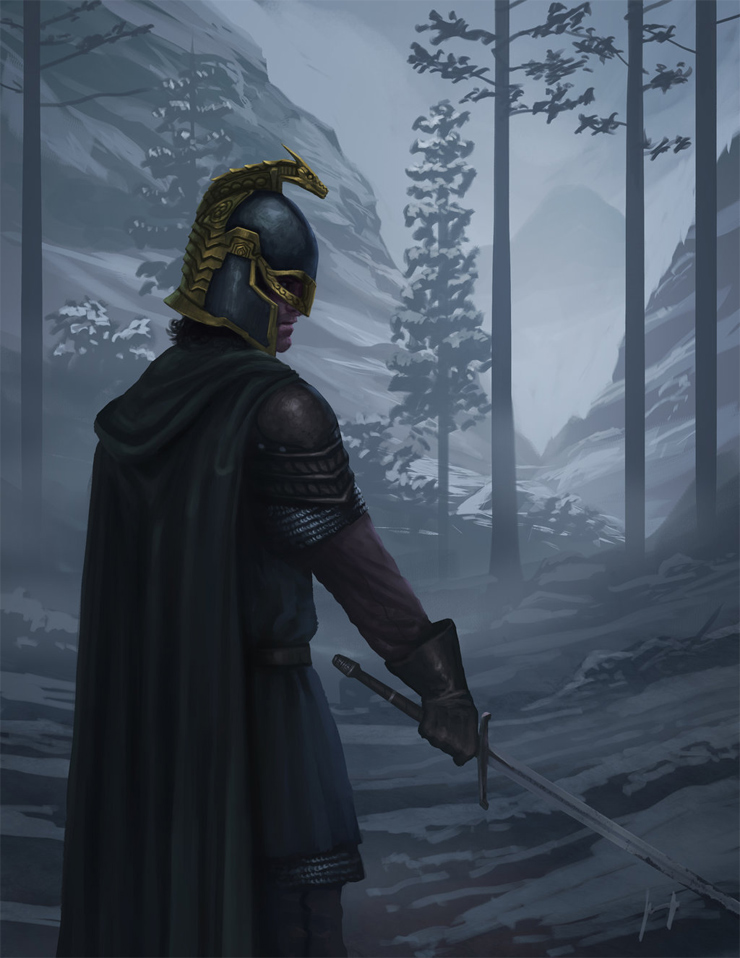
Third Age trivia: Aragorn, son of Arathorn, racks up more names and titles in his life than Túrin ever does. Like, more than twice as many, if you count translations and nicknames. Now to be fair, Strider lives much, much longer than Túrin, makes way better decisions, and wears humility instead of pride through his years of hardship. There’s less fanfare and emo drama with each naming, and the King of Gondor certainly doesn’t really need to rebrand himself so much as take on new roles. But credit where credit’s due: Elessar a.k.a. Thorongil a.k.a. Longshanks a.k.a. Wingfoot doesn’t slay a single dragon.
Well, in the next installment, we come to Chapter 22, “Of the Ruin of Doriath,” wherein the camera pans back over to Húrin so we can see how he’s handling things. Also, we’ll try and determine which Elf-realm is the next to fall. (Hint: it’s right there in the dang chapter title.)
Top image from “The Glance of Glaurung” by Alexey Rudikov
Jeff LaSala can’t leave Middle-earth well enough alone. But Tolkien geekdom aside, he wrote a Scribe Award–nominated D&D novel, produced some cyberpunk stories, and now works for Tor Books. He is sometimes on Twitter.










